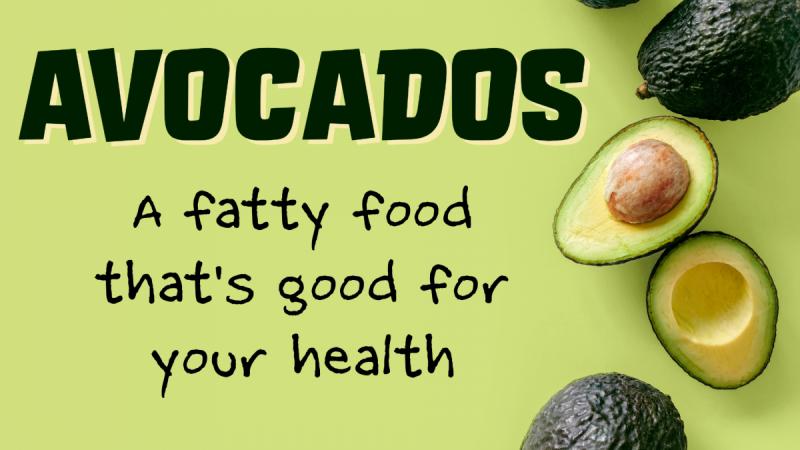
The first time I tried avocados, I was not impressed. My uncle had brought some back from California and they were overripe, so it was not a good first impression. Later, while I was living in Southern California, I fell in love with them. One of the more interesting experiences I had with them involved meeting someone who had an avocado tree in the backyard. His dog would eat the avocados that fell off the tree. I actually watched the dog eat one.
I’ve been talking about using food as medicine and this month I’m shifting to talking about healthy fats, making avocados a great transition between the two topics. Avocados are both a great medicinal food and a good source of healthy fats.
Avocados and Fatty Acids
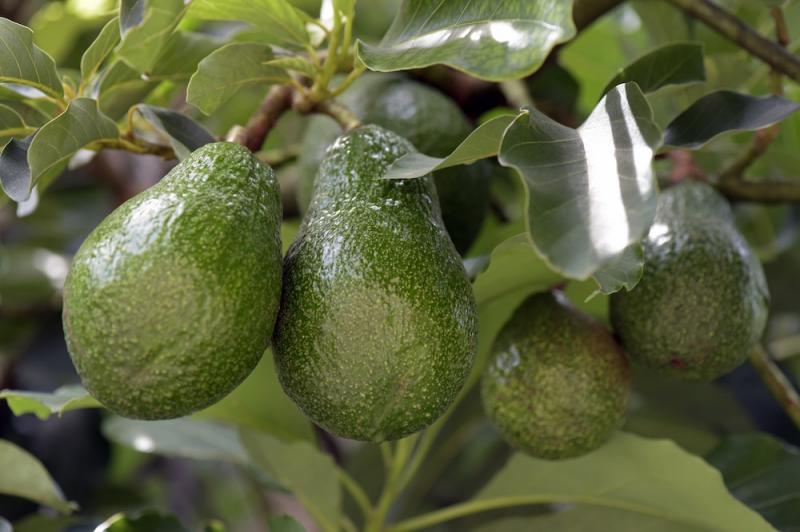 Most of the fatty acids (about 68%) in avocados are the monounsaturated fatty acid oleic acid, which is the same fatty acid olive oil is high in. Avocado also contains about 18% polyunsaturated fatty acids of the omega-6 and omega-3 variety. The rest are saturated fatty acids.
Most of the fatty acids (about 68%) in avocados are the monounsaturated fatty acid oleic acid, which is the same fatty acid olive oil is high in. Avocado also contains about 18% polyunsaturated fatty acids of the omega-6 and omega-3 variety. The rest are saturated fatty acids.
It’s a mistake to think that a food is bad just because it is high in fat. The fats in natural foods like avocados, olives, macadamia nuts, walnuts, flax seeds, and chia seeds are actually good for you. The body needs them to create cell membranes, brain tissue, and various chemical messengers like prostaglandins, steroidal hormones, and endocannabinoids. But, the wrong kind of fats, especially refined and partially hydrogenated vegetable oils, shortening, and the animal fat coming from feedlot animals, can’t create these healthy tissues.
So, it’s a good idea to avoid deep-fried foods and other unhealthy fats, but it’s also a good idea to eat some naturally fatty foods like avocados instead. Here are some of the potential health benefits of avocados.
Potential Health Benefits of Avocados
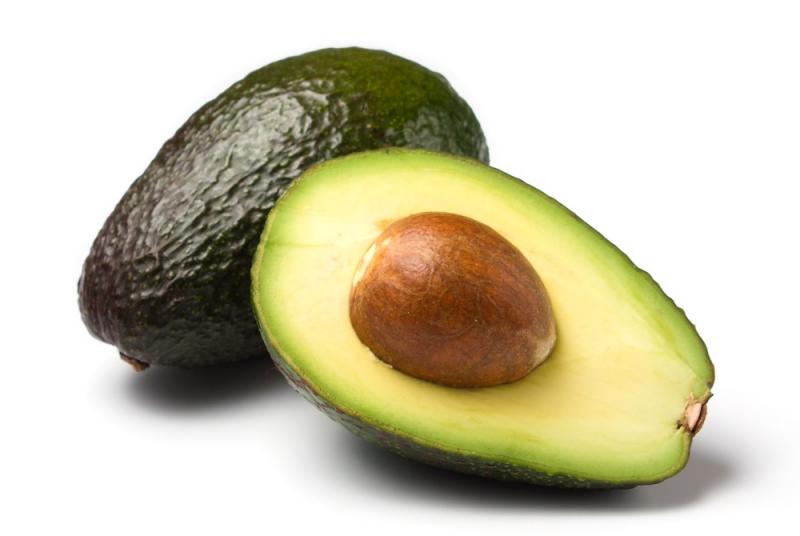 The monounsaturated fats in avocados and olive oil are heart-healthy. They can actually help lower blood cholesterol levels and there is research which suggests they can lower your risk of heart disease.
The monounsaturated fats in avocados and olive oil are heart-healthy. They can actually help lower blood cholesterol levels and there is research which suggests they can lower your risk of heart disease.
Avocados are not only high in fat, they are also high in fiber. So, eating them helps to curb appetite. Eating an avocado for breakfast can provide a feeling of fullness that helps you reduce caloric intake. It also provides a more sustained energy than that provided by eating carbohydrates, like breakfast cereals. Starting the day with a fatty food like an avocado also kicks in the fat-burning processes in the body that can help you lose weight.
The fiber in avocados also helps GI tract health. It’s the type of fiber that provides prebiotics to help create a healthier microbiome. Avocados contain lutein and zeaxanthin, the two antioxidants that help to protect the eyes from UV light.
Nutritionally, avocados are a good source of vitamin E and vitamin K1. A half an avocado also contain more potassium than a medium banana. They are also a good source of magnesium, vitamin C, and B-complex vitamins.
Avocado Oil
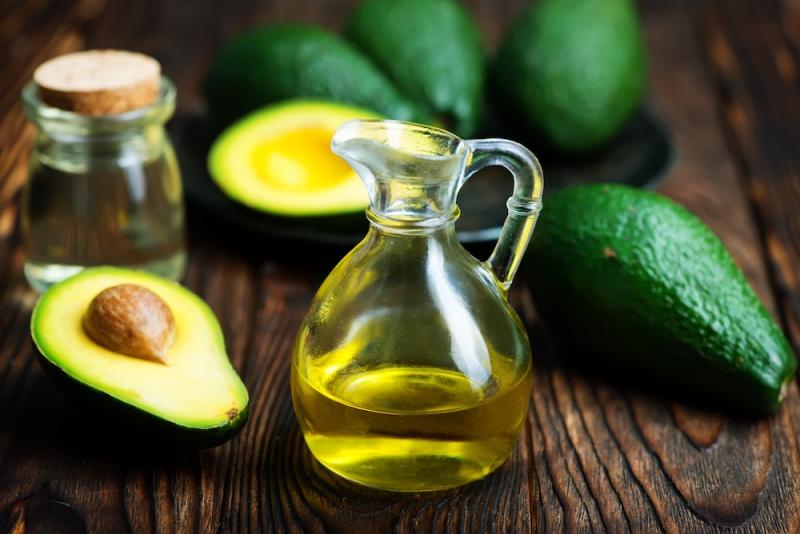 I don’t believe we should eat too many fried foods because heating oils, especially vegetable oils, creates transfats, which are harmful. However, when you do need an oil for frying you need something that can withstand the heat, as this reduces the amount of transfats produced. The smoke point is the heat at which the oil starts to break down which causes smoke to form.
I don’t believe we should eat too many fried foods because heating oils, especially vegetable oils, creates transfats, which are harmful. However, when you do need an oil for frying you need something that can withstand the heat, as this reduces the amount of transfats produced. The smoke point is the heat at which the oil starts to break down which causes smoke to form.
Butter and coconut oil have a smoke point of 350 degrees and extra virgin olive oil’s smoke point is 375. So while these oils can be used for cooking, they aren’t the best for frying. Oils with a higher smoke point, such as canola, corn, peanut, and soybean oil, which have smoke points been 400 and 450, are better for frying. These oils are problematic, however, because they have too many polyunsaturated omega-6 fats, which not only easily form transfats. Omega-6 oils can also increase inflammatory responses.
Avocado oil has a very high smoke point, approximately 520 degrees, making it great for high-heat cooking like deep frying. Yet, it’s primarily monounsaturated fatty acids like olive oil. Also, unlike olive oil, it has a neutral taste. So, it’s my preferred oil if I’m going to fry something. Its tolerance to heat also suggests it would make a good oil as a base for herbal oils and salves.
Avocado Leaves
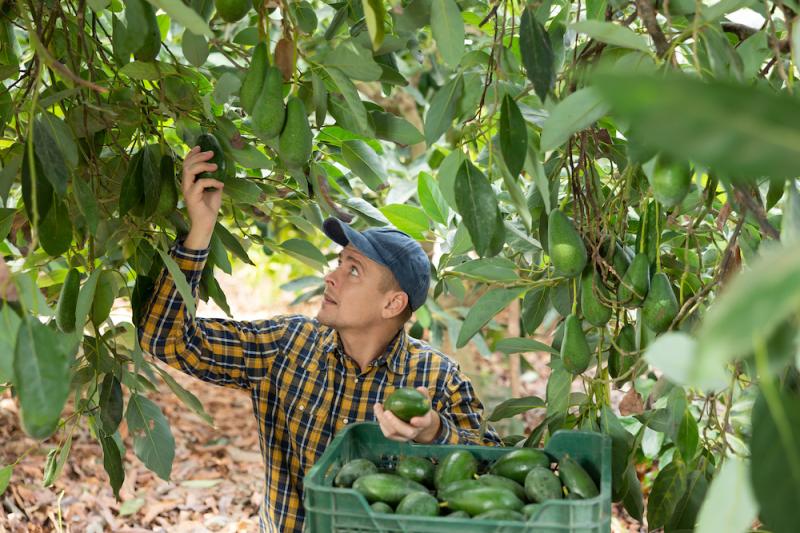 Although I’ve never used avocado leaves as medicine, there are articles that suggest they may have medicinal value. Avocado leaves are high in quercitin and polyphenols. If you’re interested in checking out some of their potential uses, here are some articles you can read.
Although I’ve never used avocado leaves as medicine, there are articles that suggest they may have medicinal value. Avocado leaves are high in quercitin and polyphenols. If you’re interested in checking out some of their potential uses, here are some articles you can read.
- 13 Health Benefits of Avocado Leaves and Side Effects by Sara Syankira
- What are the Benefits of Avocado Leaves
- Avocado Leaves Benefits, Nutrition, And Its Side Effects
So, if you live in an area where avocado trees grow and want to experiment with them, I’d love to hear about it. And, I might also mention that the mashed avocado pulp makes a good poultice for dry, irritated skin.
Avocado Recipes
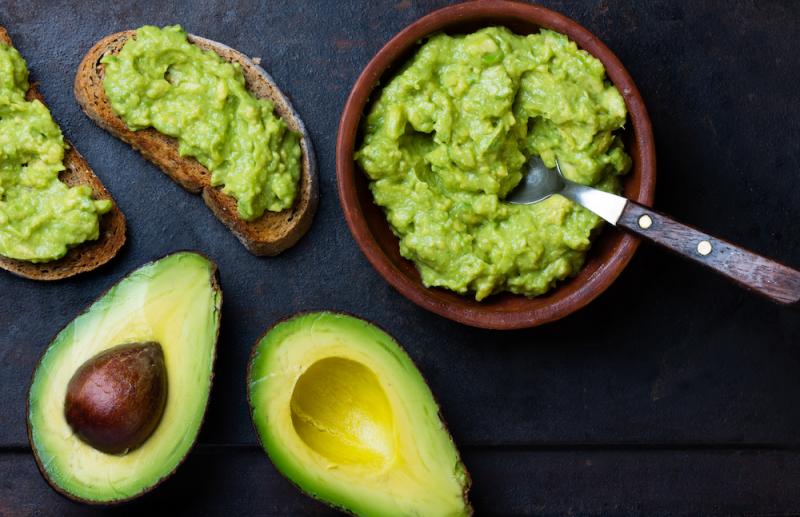 My favorite way to use avocados is to make guacamole. My preferred method is to mash the avocado up, then add a squeeze of lemon or lime juice to preserve the color and add some flavor. I also add a little salt, pepper, and cayenne to taste. But my secret ingredient is yogurt. By adding yogurt instead of sour cream, I lower the calories in the guacamole and increase the protein. I add the yogurt to taste, but it’s usually around 25-50% of the amount of avocado. So if I have one cup of mashed avocado I add about 1/4-1/2 cup of yogurt.
My favorite way to use avocados is to make guacamole. My preferred method is to mash the avocado up, then add a squeeze of lemon or lime juice to preserve the color and add some flavor. I also add a little salt, pepper, and cayenne to taste. But my secret ingredient is yogurt. By adding yogurt instead of sour cream, I lower the calories in the guacamole and increase the protein. I add the yogurt to taste, but it’s usually around 25-50% of the amount of avocado. So if I have one cup of mashed avocado I add about 1/4-1/2 cup of yogurt.
Here's another recipe I like. Years ago there was a health food store that made this great sandwich spread from avocado that they put into a pita bread. It’s easy to make. Chop up some cabbage like you’re making cole slaw. Salt the cabbage and then put mashed avocado into it instead of mayonnaise. (If you want you can add just a little mayo for flavor, but it’s not necessary.) Next mix in raw or toasted sunflower seeds to add some crunch. Again, a squeeze of lemon or lime juice helps with the color and flavor. You can eat this like cole slaw or use it like they did as a sandwich spread.
Years ago I watched an episode of Alton Brown’s Good Eats show where he did some very interesting recipes using avocado. I’ve never tried them, but they look really interesting. First, he made an avocado ice cream, basically substituting avocado for the egg. He suggested that avocados provide a similar texture and binding ability to eggs and can be substituted for them in a recipe.
He also made an avocado buttercream frosting, substituting the fat in the frosting (butter, margarine, or shortening) with avocado. This would make a healthier frosting.
If you’d like to check those recipes out, you can find them on foodnetwork.com. So, substituting avocado for mayonnaise, sour cream, or other fats is probably a healthy idea.
Of course, you don’t want to do too much of any good thing. The dog I referred to at the beginning of the article (the one who ate avocados) was a bit chubby, so use avocados in moderation as part of a balanced diet.
Downloads
Steven's Articles
-

-
Barberry and Healthy Personal Boundaries
A thorny shrub for fighting infections and supporting…
December
-

-
The Evidence for Berberine
A yellow alkaloid found in traditional infection-fighting…
-

-
The Sensible Use of Caffeinated Herbs
Kola nuts, guarana, and yerba mate and other herbs…
-

-
The Health Benefits and Problems with Coffee
This popular caffeinated beverage can be beneficial…
October
-

-
Understanding Caffeine & Cellular Adaptation
Preserving the power of caffeine's buzz and the…
September
-

-
Horseradish
A pungent spice for aiding protein metabolism…
-

-
Banaba or Crepe Myrtle
A beautiful tree from Southeast Asia whose leaves…
August
-

-
Monkeyflowers
Flower essences to help see ourselves more clearly…
-

-
Mariposa Lilies
Strengthening the bond between mother and child…
-

-
The Noble Bay Leaf
A common kitchen herb for aiding digestion and…
-

-
Epimedium: Horny Goat Weed
A circulatory stimulant and kidney yang tonic…
July
-

-
The Medicinal and Nutritional Benefits of Apricots
A nutritious fruit and valuable medicinal seed for coughs
-

-
Dogwoods
Asian dogwood is used to stop excessive discharge,…
June
-

-
Neem: The Village Pharmacy
A popular Ayurvedic remedy for dental and immune…
-

-
Spilanthes: The Toothache Plant
A traditional remedy for teeth and gums, as well…

